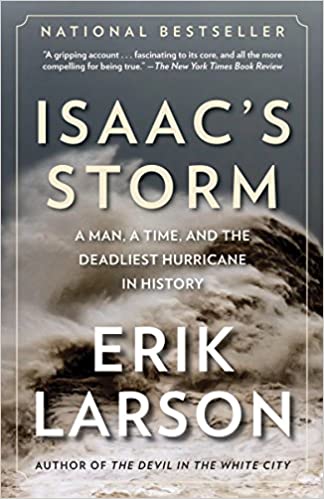
Book Review of
Isaac’s Storm
At the dawn of the twentieth century, a great confidence suffused America. Isaac Cline was one of the era’s new men, a scientist who believed he knew all there was to know about the motion of clouds and the behavior of storms. The idea that a hurricane could damage the city of Galveston, Texas, where he was based, was to him preposterous, “an absurd delusion.” It was 1900, a year when America felt bigger and stronger than ever before. Nothing in nature could hobble the gleaming city of Galveston, then a magical place that seemed destined to become the New York of the Gulf.
That August, a strange, prolonged heat wave gripped the nation and killed scores of people in New York and Chicago. Odd things seemed to happen everywhere: A plague of crickets engulfed Waco. The Bering Glacier began to shrink. Rain fell on Galveston with greater intensity than anyone could remember. Far away, in Africa, immense thunderstorms blossomed over the city of Dakar, and great currents of wind converged. A wave of atmospheric turbulence slipped from the coast of western Africa. Most such waves faded quickly. This one did not.
In Cuba, America’s overconfidence was made all too obvious by the Weather Bureau’s obsession with controlling hurricane forecasts, even though Cuba’s indigenous weathermen had pioneered hurricane science. As the bureau’s forecasters assured the nation that all was calm in the Caribbean, Cuba’s own weathermen fretted about ominous signs in the sky. A curious stillness gripped Antigua. Only a few unlucky sea captains discovered that the storm had achieved an intensity no man alive had ever experienced.
In Galveston, reassured by Cline’s belief that no hurricane could seriously damage the city, there was celebration. Children played in the rising water. Hundreds of people gathered at the beach to marvel at the fantastically tall waves and gorgeous pink sky, until the surf began ripping the city’s beloved beachfront apart. Within the next few hours Galveston would endure a hurricane that to this day remains the nation’s deadliest natural disaster. In Galveston alone at least 6,000 people, possibly as many as 10,000, would lose their lives, a number far greater than the combined death toll of the Johnstown Flood and 1906 San Francisco Earthquake.
And Isaac Cline would experience his own unbearable loss.
Meticulously researched and vividly written, Isaac’s Storm is based on Cline’s own letters, telegrams, and reports, the testimony of scores of survivors, and our latest understanding of the hows and whys of great storms. Ultimately, however, it is the story of what can happen when human arrogance meets nature’s last great uncontrollable force. As such, Isaac’s Storm carries a warning for our time.
Lynn's Review

Isaac’s Storm by Erik Larson reminds us that major weather events are nothing new. In 1900, over 6,000 people lost their lives when a hurricane hit Galveston, Texas. Erik Larson takes you on a journey of what led up to the storm, the storm and the people that lived through it, and the devastation that took years to overcome.
Several years ago I read Al Roker’s book, Storm of the Century, about this same storm. At the time I enjoyed it, but now that I have read Isaac’s Storm, I say skip Al Roker’s book and read Erik Larson’s book. I thought Isaac’s Storm was much better written.
If you enjoy nonfiction books about science, weather, or have forgotten about history this is a good one.

Isaac’s Storm was my Texas non-fiction choice. I agree with your review. It was a very good book. Erik Larson has become one of my favorite authors.
I love his writing. I have Dead Wake, so I think it will be the next book of his that I read.
I don’t have Dead Wake yet but Thunderstruck is on my TBR shelf and will be my next of his to read.